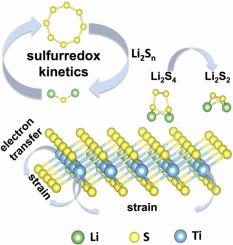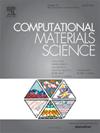Theoretical study on strain engineering for improving the performance of TiS2 monolayer as cathode material for lithium-sulfur batteries
IF 3.3
3区 材料科学
Q2 MATERIALS SCIENCE, MULTIDISCIPLINARY
引用次数: 0
Abstract
As an effective method for modulating electrochemical characteristics, strain engineering is employed in this study to optimize the properties of TiS2 monolayer. Through first-principles calculations, we examine the influence of biaxial compressive strain on their structural integrity, electronic structure, and catalytic properties relevant to lithium-sulfur (Li-S) batteries applications. The results reveal that compressive strain enhances the electrical conductivity by increasing band overlap near the Fermi level and strengthens the adsorption of lithium polysulfides (LiPSs) within a moderate binding range. At −5 % strain, the sulfur reduction reaction (SRR) barrier from Li2S4 to Li2S2 decreases from 0.32 eV to 0.18 eV, while the decomposition energy of Li2S and the diffusion barrier of Li+ are also significantly reduced. These improvements in both catalytic activity and polysulfide anchoring under moderate compressive strain suggest that TiS2 is a promising candidate for use in next-generation Li-S battery cathodes.

提高TiS2单层锂硫电池正极材料性能的应变工程理论研究
作为一种有效的电化学特性调制方法,本研究采用应变工程对TiS2单层膜的性能进行优化。通过第一性原理计算,我们研究了双轴压缩应变对其结构完整性、电子结构和与锂硫(Li-S)电池应用相关的催化性能的影响。结果表明,压缩应变通过增加费米能级附近的带重叠来提高导电性能,并在中等结合范围内增强对多硫化锂(LiPSs)的吸附。在−5%应变下,Li2S4到Li2S2的硫还原反应势垒(SRR)从0.32 eV降低到0.18 eV, Li2S的分解能和Li+的扩散势垒也显著降低。在中等压缩应变下,TiS2在催化活性和多硫化物锚定方面的这些改进表明,TiS2是下一代锂电池阴极的有希望的候选者。
本文章由计算机程序翻译,如有差异,请以英文原文为准。
求助全文
约1分钟内获得全文
求助全文
来源期刊

Computational Materials Science
工程技术-材料科学:综合
CiteScore
6.50
自引率
6.10%
发文量
665
审稿时长
26 days
期刊介绍:
The goal of Computational Materials Science is to report on results that provide new or unique insights into, or significantly expand our understanding of, the properties of materials or phenomena associated with their design, synthesis, processing, characterization, and utilization. To be relevant to the journal, the results should be applied or applicable to specific material systems that are discussed within the submission.
 求助内容:
求助内容: 应助结果提醒方式:
应助结果提醒方式:


